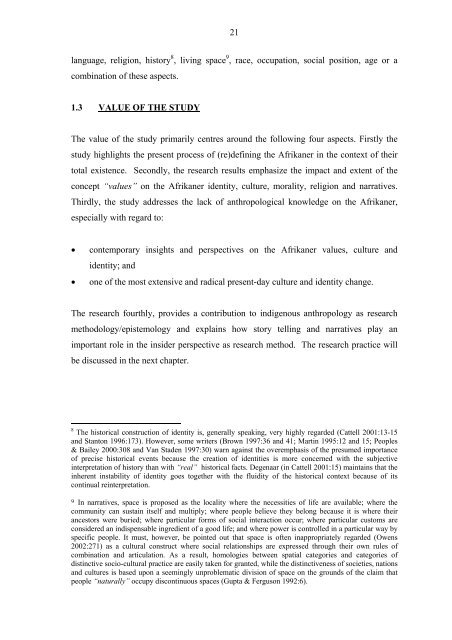AFRIKANER VALUES IN POST-APARTHEID SOUTH AFRICA: AN ...
AFRIKANER VALUES IN POST-APARTHEID SOUTH AFRICA: AN ...
AFRIKANER VALUES IN POST-APARTHEID SOUTH AFRICA: AN ...
Create successful ePaper yourself
Turn your PDF publications into a flip-book with our unique Google optimized e-Paper software.
21<br />
language, religion, history 8 , living space 9 , race, occupation, social position, age or a<br />
combination of these aspects.<br />
1.3 VALUE OF THE STUDY<br />
The value of the study primarily centres around the following four aspects. Firstly the<br />
study highlights the present process of (re)defining the Afrikaner in the context of their<br />
total existence. Secondly, the research results emphasize the impact and extent of the<br />
concept “values” on the Afrikaner identity, culture, morality, religion and narratives.<br />
Thirdly, the study addresses the lack of anthropological knowledge on the Afrikaner,<br />
especially with regard to:<br />
• contemporary insights and perspectives on the Afrikaner values, culture and<br />
identity; and<br />
• one of the most extensive and radical present-day culture and identity change.<br />
The research fourthly, provides a contribution to indigenous anthropology as research<br />
methodology/epistemology and explains how story telling and narratives play an<br />
important role in the insider perspective as research method. The research practice will<br />
be discussed in the next chapter.<br />
8 The historical construction of identity is, generally speaking, very highly regarded (Cattell 2001:13-15<br />
and Stanton 1996:173). However, some writers (Brown 1997:36 and 41; Martin 1995:12 and 15; Peoples<br />
& Bailey 2000:308 and Van Staden 1997:30) warn against the overemphasis of the presumed importance<br />
of precise historical events because the creation of identities is more concerned with the subjective<br />
interpretation of history than with “real” historical facts. Degenaar (in Cattell 2001:15) maintains that the<br />
inherent instability of identity goes together with the fluidity of the historical context because of its<br />
continual reinterpretation.<br />
9 In narratives, space is proposed as the locality where the necessities of life are available; where the<br />
community can sustain itself and multiply; where people believe they belong because it is where their<br />
ancestors were buried; where particular forms of social interaction occur; where particular customs are<br />
considered an indispensable ingredient of a good life; and where power is controlled in a particular way by<br />
specific people. It must, however, be pointed out that space is often inappropriately regarded (Owens<br />
2002:271) as a cultural construct where social relationships are expressed through their own rules of<br />
combination and articulation. As a result, homologies between spatial categories and categories of<br />
distinctive socio-cultural practice are easily taken for granted, while the distinctiveness of societies, nations<br />
and cultures is based upon a seemingly unproblematic division of space on the grounds of the claim that<br />
people “naturally” occupy discontinuous spaces (Gupta & Ferguson 1992:6).
















